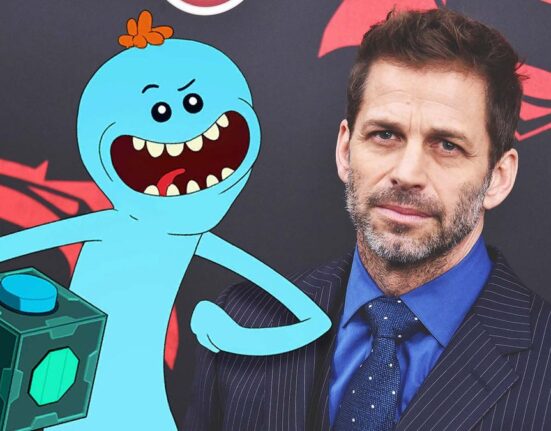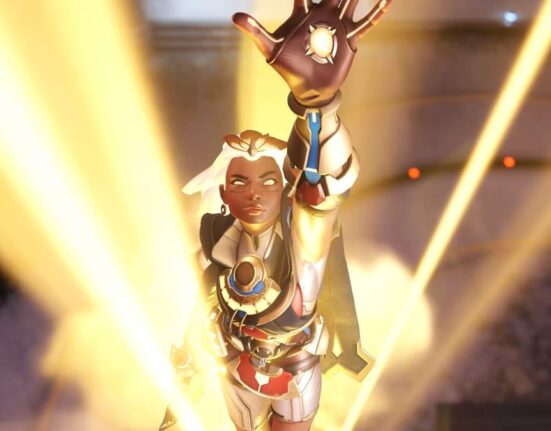You know Sweet Anita. You’ve seen her streams, stumbled across her Twitter account, or watched clips of her on TikTok. She’s likable—the kind of person you could watch do anything, even as she clicks her tongue, whistles, and tells you fuck off. You’ve probably had her curse you out on repeat in a video playing in the background while you wash the dishes. She’s got nearly 2 million followers on Twitch, thanks in large part to her candor and her reputation as “the Tourette’s streamer.” With such a massive internet presence, Sweet Anita has gone to great lengths to craft and maintain her image, as well as her safety.
Read More: The Singular Life of Twitch’s Most Foul-Mouthed Streamer
There’s a reason why her real name isn’t on the internet, why her team bans anyone who sexualizes her in her Twitch chat, why she asks to record our interview on her end, too. But despite the work she’s done to ensure that she is in control of her own narrative, the recent controversy where fellow streamer Brandon “Atrioc” Ewing accidentally revealed that he had paid to watch deepfake porn posted by a content creator on a site similar to OnlyFans, and simultaneously also revealed that she was one of the victims of those deepfakes has shaken her. It “feels like a form of ridicule,” she told Kotaku.
Though the content has since been taken down, the ramifications of it linger: the women involved (Sweet Anita, QT Cinderella, Pokimane, and Maya Higa) have to grapple with the knowledge that their likenesses were grafted onto porn stars’ bodies, that their peer paid for this content, that they have to do the extensive labor required to get it removed from the internet. Some Twitch stars have already explored legal action against the site that hosted the content. Twitch, still, has not responded to Kotaku’s request for comment on the ordeal.
But what about the victims? What about the women who were forced to see avatars of themselves doing explicit sexual acts? What do they do now that the footage is out there? And what do you do if you aren’t a wealthy Twitch streamer with the means to combat this kind of sexualized violence?got it
“I am being forced and sold [into sex work] by someone I don’t know,” Sweet Anita tells me via Discord voice call. She’s explicitly clear: she doesn’t have a problem with sex work and even has friends in the industry, but she made a decision to not participate in that world, despite the heaps of financial gain she claims she could earn from it.

“I’ve been offered thousands of pounds in DMs for feet pics,” she says. “And I won’t do feet pics. I’ll walk barefoot on a beach, but I wouldn’t sell a picture of my foot for a few grand…So that’s the level of hard, ‘No, I will not provide sexual services, it will put me in danger, it will cause people to feel like they can disrespect and dehumanize me, it will affect people’s ability to listen to my opinions take me seriously my ability to contribute to anything because the stigma towards sex workers is so strong’.”
She’s not wrong about the stigma—Amouranth, one of the top women Twitch streamers, who was allegedly forced to participate in her infamous hot tub streams by an abusive husband, has an OnlyFans where she makes explicit content. She’s been simultaneously lambasted for creating sexy Twitch content by (mostly) men, while racking up $33 million in OnlyFans revenue thanks to what is likely mostly male subscribers. Despite being one of Twitch’s biggest success stories, some people are quick to reduce Amouranth’s fame to her sex appeal even as she repeatedly shows expert business sense and, more recently, announced a pivot away from explicit content.
“They want to see you as a whore, no matter what you do. And they want to hate you for being a whore. It doesn’t matter whether you participate, they’ll make you participate in it,” Sweet Anita says. You can be objectified against your will (as Amouranth and all of the women streamers who were deepfaked were), but if you self-objectify, you’re a whore. And what makes matters worse is that, in this most recent instance, someone else was making money off of their objectification.
She’s not afraid to get explicit, telling me that she’s come across the “odd fan video” of men filming themselves ejaculating onto a screen playing one of her Twitch streams, seen her face “crudely pasted onto a still porn image,” knows about the people who roleplay as her in sexually charged chats—but this deepfake situation felt different. “I’d never seen video porn of me before. It’s very unsettling.”
In his statement, Ewing claims that the efforts of QT Cinderella and Ryan Morrison (known as the Video Game Attorney on Twitter) resulted in the controversial content getting taken down. Kotaku can confirm that, on January 31, the creator of that content replaced all of the deepfakes with an apology note. Sweet Anita “does not accept that apology.”
I reached out to Morrison via Twitter DM, and he told me that his firm focuses on “brand enforcement against all infringing merchandise and content, scam accounts, and unfortunate creations like this’’ and that they “went into action immediately here going after not just the source, but also where it had leaked and spread to.” He admits that the “process is quite complicated depending on where the leaks end up, as not many websites in this realm of online content comply with traditional takedown methods.”
So, in this instance, the content was removed—but this is the exception, not the rule, when it comes to getting deepfake and other revenge porn taken off the internet. It can often be a long, arduous, and litigious process that many victims don’t have the resources to dedicate to—and even if they do, it doesn’t always work out. And that’s because governments still don’t know how the hell to deal with this shit.
“There’s no federal protections right now,” Dr. Mary Anne Franks, professor of law at University of Miami and president of the Cyber Civil Rights Initiative, tells me over the phone. “There isn’t something that you could point to as a rule of general applicability within the United States, at least to say ‘this is prohibited by law’.“So it’s left up to the states to decide if they want to pass laws to address this form of abuse. And some of them have tried to do so. There haven’t been that many so far.”
Of course, you can retain legal counsel, like QT Cinderella did, and, if you’re in California or Virginia (the only two states with deepfake laws on the books), your legal process may have a better chance of success. But ultimately, without an overarching federal law, it’s “unknown how those cases are going to go and how effective they’re going to be,” Dr. Franks explains. It’s why Pokimane said, before this entire deepfake scandal rocked Twitch, that she wants to help enact tougher laws on revenge porn. Dr. Franks tells me she wishes she had access to her, so that they could work together on something.

These issues are why Dr. Franks created the nonprofit Cyber Civil Rights Initiative, which provides takedown guides for victims of nonconsensual pornography. Unfortunately, even with the help of those guides, “you are kind of at the mercy of these companies and their willingness to take material down,” she admits.
Sweet Anita recognizes that her and the other women targeted by the Twitch deepfakes have a level of privilege other women may not: money. “There are law firms that will charge thousands a month to scour the internet for anyone making porn of you, any of those Reddits I described with the cum shots and stuff. They’ll find people who infringe on your copyright in any way. And that’s the lengths you have to go to to avoid this content being made of you,” she says swiftly, anger rising in her voice.
“I’m always being told that I should accept this because it comes with the territory. But what are you going to say when that happens to your sister or your boss or your co-worker? Because they don’t have a job in the public eye, but they’re just as vulnerable to this.”
Towards the end of our conversation, Sweet Anita expresses a profound feeling of fatigue in the face of this scandal. Not long ago, she tells me, she had a stalker “sleeping in [her] back garden,” and alleges that the UK police “did nothing for years.” She emphatically calls them “limp and not effective,” declaring that she is in charge of her own safety.
Sweet Anita’s status as a public figure means she has, unfortunately, some experience in dealing with doxxing, stalking, and other harmful behavior exhibited online, so she has a semblance of a game plan for how to deal with this deepfake porn situation. But, as even she states, that’s not the case for so many women who have become victims of sexually tinged cyberbullying or revenge porn.
And now, she’s forced to deal with yet more punishment for the crime of being a woman online. “If I do decide to take legal action against people who deepfake me in the future, I will have extra things on my list which distract me from making content. And yes, it will inhibit me and hold me back in a way that I feel a lot of other content creators would not have to deal with,” she points out. As Pokimane revealed in a recent stream, she even pays for a service whereby mods block trolls for her on her own Twitter account, so that she doesn’t even have to see the content they post in her replies.
When I ask about what she can, legally, do in the UK, where an Online Safety Bill that would address this kind of abuse is still bouncing around Parliament, she wants a “price tag” on these deplorable actions. “I feel like that would probably be a huge way to deter people from wanting to make it if they know that they could potentially lose a lot of money,” she suggests. In 2018, a $6.4 million judgment was awarded in a revenge porn case in California, after a man posed sexual photographs and videos of his ex-girlfriend on porn sites and even impersonated her on online dating sites. That same year in the UK, YouTube star Chrissy Chambers won a “landmark” revenge porn case after filing a civil claim against an ex who posted sexual videos of her online.
But the manner in which these cases are filed and their level of success vary wildly, thanks to differing laws across the globe. California has laws on the books against this, but if someone in, say, Florida, is a victim of revenge porn, their litigators may choose to approach it from a copyright infringement or abuse angle. That’s why sweeping federal reform is so important.
It’s why Dr. Franks wants “new laws and new remedies” to combat “new, cutting-edge abuses.” She acknowledges that the technology used in these abuses far outpaces our governments’ understanding of it, which poses unique and often frustrating problems for its victims. She worked on a deepfake bill that was just recently introduced in Illinois, but she knows that’s not enough. “I’m hoping more media attention will help resolve this,” she says. “We’ve been advocating for federal legislation and state legislation on [these issues] for years now…our federal bill has gotten tantalizingly close in the last six years to being passed.” Mitch McConnell stripped it out of the omnibus bill last year at the last minute, she tells me.
“We are focused on three areas of reform,” she explains. “We’re trying to change the laws where it’s necessary, we try to change tech companies’ practices when we can, and we try to raise social awareness about the problems and the kinds of fallout that this can cause.”
She knows, as so many women do, that getting harmful content of yourself removed from the internet can feel like a daunting and impossible task. “Victims shouldn’t be the ones having to do this work,” she says, echoing a sentiment Sweet Anita expressed during our earlier conversation. “We welcome survivors who feel that they have the energy and want to join the movement and be part of it. But it shouldn’t be their responsibility to have to fight it alone or to make these calls alone…we’re very much hoping that people will contact us about ways that they can be informed of what we’re working on and what we’re trying to do.”
You can contact the Cyber Civil Rights Initiative online or via their 24/7 hotline at 1-844-878-2274.







Leave feedback about this